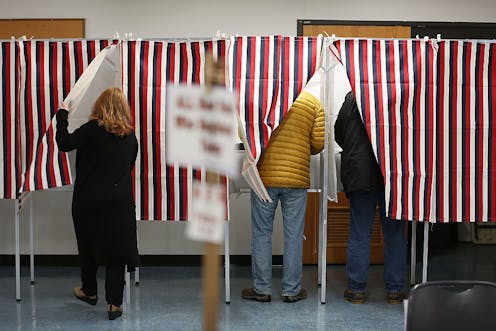Americans who aren't sure about God are a fast-growing force in politics – and they're typically even more politically active than white evangelicals
- Written by Ryan Burge, Assistant Professor of Political Science, Eastern Illinois University

It’s hard to remember now, given the attempts to overturn the 2020 presidential election[1], but the day after votes were cast, one theme stood out: voter turnout.
Every state in the nation saw higher turnout in 2020 than 2016, according to an analysis from the Pew Research Center[2]. Overall, there were more than 158 million votes cast, according to the Federal Election Commission[3] – nearly 22 million more[4] than just four years prior.
Turnout will likely play an outsize role in the 2022 midterms, too, as voters determine what political party will have control of the U.S. House of Representatives and the Senate in January 2023. As a political scientist[5] who studies the intersection of religion and politics, I am interested in which groups may have a strong impact on the balance of power. And if the data is any guide, there are two key communities political analysts often overlook: atheists and agnostics.
Partisan divides
In 2008, almost 8% of the entire U.S. population claimed to be atheist or agnostic, according to my analysis of data from the Cooperative Election Study[6], or CES – an annual survey coordinated by a team at Harvard University. Atheists believe that there is no higher power in the universe, while agnostics contend that a higher power may exist but it’s impossible to know for certain.
By 2021, that share had risen to just about 12%. But atheists and agnostics are often left-leaning in their political persuasion, and their rapid ascendance in the American religious landscape[7] is proving much more consequential to the Democratic Party than the GOP.
Just 4% of people who align with the Republican Party say that they are atheist or agnostic[8]. That same figure was 3% when Barack Obama won the White House in 2008.
However, according to my analysis of the CES data[9], 1 in 5 Democrats today are atheist or agnostic, an increase of eight percentage points from 2008.
Getting to the ballot box
Just because these groups have increased as a percentage of the overall population does not necessarily mean their growth will translate to political wins during the 2022 midterms. While political scientists have struggled[10] with how to measure voter turnout through survey data, it’s possible to use other measures to infer just how politically active atheists and agnostics are – and there’s strong evidence that they will make their presence felt on Election Day.
The CES[11] asks respondents if they have engaged in a number of political activities over the prior 12 months. Secular Americans’ political engagement comes into sharper focus when their behavior is compared with that of another group, one that is often considered very politically active[12]: white evangelicals.
Over the past 40 years, the religious right has won many victories by organizing a loose coalition of theologically and politically conservative faith groups to vote, advocate and agitate. Overturning the Roe v. Wade decision[13], for example – which the Supreme Court did in June 2022 – was a long-cherished goal of the movement, resulting in several states’ banning abortion[14] in nearly all circumstances.
In 2020, 8% of white evangelicals attended a political meeting such as school board or city council, according to the CES[15]. Yet the percentage is even higher for atheists – 11% – and agnostics – 10%. There was also a small difference in the data about putting up a political yard sign or bumper sticker. Among atheists, 27% had done so, compared with 21% of white evangelicals.
However, when it comes to political protests, there’s no doubt that secular Americans are more politically engaged. In 2020, 18% of atheists and 16% of agnostics said that they had gone to a march or rally about a political issue, versus just 5% of white evangelicals, based on CES data[16]. When it comes to donations, the gulf is even wider. In 2020, half of all atheists made a political donation, along with 43% of agnostics. In comparison, only about a quarter of white evangelicals made a political donation to a candidate or party.
Speaking up – and being heard
Democratic candidates have shown increasing awareness that they are becoming more dependent on secular voters. For instance, in April 2018, members of Congress founded the Congressional Freethought Caucus[17] to specifically focus on these voters’ needs and concerns.
Though atheists and agnostics are still a relatively small portion of the population, there’s strong evidence they will make their voices heard during the 2022 midterms – and help campaigns with funding and support at every stage, not just on Election Day. Whether Republicans can counter this level of engagement from specific religious groups will be a key question of the upcoming midterms.
References
- ^ attempts to overturn the 2020 presidential election (abcnews.go.com)
- ^ analysis from the Pew Research Center (www.pewresearch.org)
- ^ according to the Federal Election Commission (www.fec.gov)
- ^ nearly 22 million more (www.fec.gov)
- ^ a political scientist (scholar.google.com)
- ^ Cooperative Election Study (cces.gov.harvard.edu)
- ^ rapid ascendance in the American religious landscape (doi.org)
- ^ say that they are atheist or agnostic (www.fortresspress.com)
- ^ the CES data (cces.gov.harvard.edu)
- ^ have struggled (doi.org)
- ^ The CES (cces.gov.harvard.edu)
- ^ very politically active (www.routledge.com)
- ^ Overturning the Roe v. Wade decision (www.oyez.org)
- ^ banning abortion (www.nytimes.com)
- ^ according to the CES (dataverse.harvard.edu)
- ^ CES data (dataverse.harvard.edu)
- ^ founded the Congressional Freethought Caucus (thehill.com)
Authors: Ryan Burge, Assistant Professor of Political Science, Eastern Illinois University

